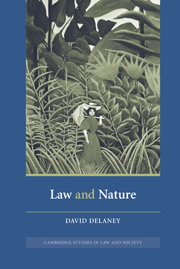Book contents
- Frontmatter
- Contents
- Acknowledgments
- Part I Situating nature
- Part II Rendering nature
- 6 It's a slippery slope: law and the forces of nature
- 7 Doctrinal wilderness and the path of interpretation: law and wilderness
- 8 Wild justice and the endangerment of meaning: law and endangered species
- 9 Puka's choice: law and animal experimentation
- 10 Fear of falling: law and bestiality
- 11 The births of nature and tradition: law and reproductive technologies
- 12 Doctrinal mutations at the edge of meaning: law and genetic screening
- 13 Return of the beast within: law and biological criminal defenses
- 14 Controlling dreams: law and the involuntary medication of prisoners
- Part III Judging nature
- References
- Index
12 - Doctrinal mutations at the edge of meaning: law and genetic screening
Published online by Cambridge University Press: 22 July 2009
- Frontmatter
- Contents
- Acknowledgments
- Part I Situating nature
- Part II Rendering nature
- 6 It's a slippery slope: law and the forces of nature
- 7 Doctrinal wilderness and the path of interpretation: law and wilderness
- 8 Wild justice and the endangerment of meaning: law and endangered species
- 9 Puka's choice: law and animal experimentation
- 10 Fear of falling: law and bestiality
- 11 The births of nature and tradition: law and reproductive technologies
- 12 Doctrinal mutations at the edge of meaning: law and genetic screening
- 13 Return of the beast within: law and biological criminal defenses
- 14 Controlling dreams: law and the involuntary medication of prisoners
- Part III Judging nature
- References
- Index
Summary
INTRODUCTION
Both expert and popular discussions of genetics are commonly framed by the inherited dichotomy of nature and nurture. Nurture, in this context, signifies the social and, perhaps, the volitional, that is, the domain of the human. Nature, as in other contexts, signifies physicality and physically based necessity. It is also common for the “nurture” side of the formula itself to be naturalized as “the environment.” On the other hand, aspirations for seizing control over the mechanics of genetics by way of genetic engineering or the development of gene therapies can also be construed as the ultimate subordination of nature to the realm of choice and freedom. The dream of controlling genetic processes can represent the ultimate domestication of nature and the triumph of knowledge over blind fate. In any case, genetic discourse draws on and reproduces – even as it mutates – inherited notions of the relationship between humans and nature.
Most obviously, “genes” or segments of chromosomes consisting of lengths of DNA, are physical substances. However else we may interpret them, what we interpret are biochemical, molecular, ultimately atomic, units of matter. The world of the gene is the physical world: biochemical processes operate among DNA, RNA, proteins, and enzymes at the intracellular and intercellular level of reality. But the idea of the gene is also, as we shall see, a profoundly powerful social and political resource. No less than animality and wilderness, it is a cultural artifact.
- Type
- Chapter
- Information
- Law and Nature , pp. 300 - 328Publisher: Cambridge University PressPrint publication year: 2003



